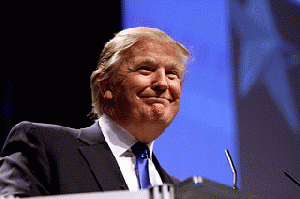Love him or hate him, and most progressives do hate him, Republican front runner Donald Trump resists both categorization and the policies of the Republican Party establishment.
Some of his policies are actually progressive.
No, not his ones towards immigrants, especially illegal ones. But a days ago he suggested we stop buying Saudi Arabian oil until they stop supporting ISIS and Jihadists and actually counter them.
He said: "If Saudi Arabia was without the cloak of American protection, I don't think it would be around."
In a long New York Times interview, he answered the question: "Mr. Trump, you have talked about your plans to defeat ISIS, and how you would approach it. Would you be willing to stop buying oil from the Saudis if they're unwilling to go in and help?"
Oh yeah, sure. I would do that. The beautiful thing about oil is that, you know, we're really getting close, because of fracking, and because of new technology, we're really in a position that we weren't in, you know, years ago, and the reason we're in the Middle East is for oil. And all of a sudden we're finding out that there's less reason to be.
Here are more details from a recent Bill Still Report (#741c):
As Trump points out, with oil prices at record lows, we certainly have the leverage now to send their economy into a fatal tailspin if we stop buying their oil. Furthermore, as Bill Still's high level but anonymous source says, Saudi Arabia supports its unskilled native population with welfare payments that would have to be cut back or eliminated so that these people would have to do the work they currently employ imported foreigners, under some of the world's most deplorable conditions, to do instead. Now, it must be said that Trump, who has been accused of employing underpaid immigrant labor himself at his many domestic hotels and development projects, is no stranger to worker exploitation, but intended or not, this would be a blow to the Saudi subsidized imported worker system. Still further says the result would be "some sort of Saudi Spring, some sort of Democratic movement, and the Royal family would be out."
Still's source, though maybe not Trump himself, also suggested the Saudis would be forced to absorb the migrants fleeing Syria and Iraq in their own "vast deserts," with new cities. They certainly have the room and the wealth to do it. Trump could also force the Saudis to get out of Yemen, which has been virtually destroyed by Saudi Arabia's air forces, supplied by America and currently ranked 28th most powerful army in the world by GlobalFirepower.com.
Further, the Saudis, who are both literally and figuratively, the "Mecca" of Islam as well as the source of most of the world's Jihadist terrorists, would be forced to stop funding mosque-building in the West, especially the most radical Wahhabi ones. This would reduce the presence and influence of Radical Islam and the possibility of reactionary community policies like Sharia Law being implemented int he West. Oddly, Progressives have not taken this threat to the liberal values of the West seriously, and in some cases have even supported the Islam "underdog" despite the clear opposition of this brand of backwards, reactionary, ultra-conservative, religion to everything an "enlightened" Western culture claims to believe.
Neither Bill Still nor Donald Trump believes there is such a thing as Global Warming or man-made climate change. Nevertheless, with the upward effect on global oil prices a policy of ending importation of Saudi Arabian oil - supported by both many renewable-energy-favoring progressive groups on the Left, and by Right-leaning groups such as T. Boone Pickens' Pickens Plan - there would be a boon in renewable energy industries like Solar, Wind, and Geothermal. Currently, these industries rely on heavy government subsidies when oil is at its current mid-30s to low 40s dollar per barrel range. If oil prices were to climb back to, say, the $50-$60 range, these industries would become more competitive and able to survive without the subsidies that a Trump Administration woudl surely reduce if not eliminate (separately, Trump has said he wants to eliminate the Environmental Protection Agency). Although it's certainly not his intent, a no-Saudi-oil policy would do more to promote ending dependence on oil and natural gas, not just imported oil, than just about anything the Obama Administration has done. It might offset the addition of Iranian oil, now just starting to flow to Europe since the Iranian Nuclear deal was brokered and signed by Obama and the United States (opposed by Trump).
Ramping up production of oil and natural gas in America to replace Saudi oil supplies would surely bring out the environmentalists and anti-fossil fuel folks, and this would only add to the price of oil to the extent they are successful in stopping U.S. production. This, of course, would be opposed by a Trump president, but the states have their own populations to worry about and their own environmental concerns, even without an EPA to watch over them.
Since it's unlikely the Saudi sponsorship of Jihadists could or would turn around easily, it's likely this policy would be around for years, or at least until there was regime change in that repressive country. Of course, this could mean the spread of ISIS too, producing a backfire of the intent to get Saudi Arabia to stop sponsoring terrorism, but with their main source of funding gone, and perhaps the world waking up finally to the destability of nations produced by the oil curse, it might be the best solution for both the Middle East and for the planet.
Donald Trump, peacemaker and environmental world-saver? That may be stretching things too far, but one thing is clear, actions have unintended consequences, even good ones, and even if you're name is Donald Trump.






